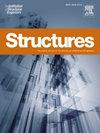带有混合吸能部件的 SCS 面板的冲击行为:实验和分析研究
IF 3.9
2区 工程技术
Q1 ENGINEERING, CIVIL
引用次数: 0
摘要
首先开发了一种带有前铝泡沫层和后吸能连接器的新型钢-混凝土-钢板(SCS-FL-EAC)。通过落重冲击试验研究了 SCS-FL-EAC 的动态行为。确定了 SCS-FL-EAC 冲击过程的三个阶段。在冲击荷载下,泡沫铝层和吸能连接器被压碎。泡沫铝层达到致密化,并在弹丸下方观察到局部压痕。在吸能连接器的褶皱钢板四角还发现了塑料铰链。SCS 面板表现出整体弯曲变形和局部变形的双线性组合。此外,还研究了铝泡沫层对 SCS-FL-EAC 抗冲击性能的影响。结果表明,铝泡沫层的加入有效地减轻了惯性效应,降低了最大冲击力。此外,随着泡沫铝层厚度的增加,SCS-FL-EAC 的抗冲击性能也有所提高。此外,还提出了一个分析模型来预测 SCS-FL-EAC 在受到冲击载荷时的力和位移响应,预测的冲击响应与实验结果显示出良好的一致性。本文章由计算机程序翻译,如有差异,请以英文原文为准。
Impact behavior of the SCS panel with hybrid energy absorbing components: Experimental and analytical studies
A new steel-concrete-steel panel with front aluminum foam layer and rear energy absorbing connector (SCS-FL-EAC) was firstly developed. The dynamic behavior of SCS-FL-EAC was studied through conducting drop-weight impact tests. Three stages of impact process of SCS-FL-EAC were identified. The aluminum foam layer and energy absorbing connector were crushed under impact loading. The aluminum foam layer reached densification, and a local indention was observed beneath the projectile. Plastic hinges were also found at the corners of the pleated steel plate of the energy absorbing connector. The SCS panel exhibited the combination of bi-linear global flexural deformation and local deformation. Furthermore, the effects of aluminum foam layer on the impact resistant performances of SCS-FL-EAC were investigated. The results indicated that the inclusion of the aluminum foam layer effectively mitigated inertial effects and reduced the maximum impact force. Additionally, the SCS-FL-EAC demonstrated improved impact-resistant performances with an increased thickness of the aluminum foam layer. Furthermore, an analytical model was proposed to predict the force and displacement responses of SCS-FL-EAC subjected to impact load, and the predicted impact responses showed good agreement with experimental results.
求助全文
通过发布文献求助,成功后即可免费获取论文全文。
去求助
来源期刊

Structures
Engineering-Architecture
CiteScore
5.70
自引率
17.10%
发文量
1187
期刊介绍:
Structures aims to publish internationally-leading research across the full breadth of structural engineering. Papers for Structures are particularly welcome in which high-quality research will benefit from wide readership of academics and practitioners such that not only high citation rates but also tangible industrial-related pathways to impact are achieved.
 求助内容:
求助内容: 应助结果提醒方式:
应助结果提醒方式:


